|
|
|
Sort Order |
|
|
|
Items / Page
|
|
|
|
|
|
|
| Srl | Item |
| 1 |
ID:
189831
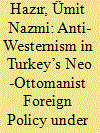

|
|
|
|
|
| Summary/Abstract |
After 2013, Turkey’s foreign policy has been noted for neo-Ottomanist
rhetoric and anti-Western discourse, which resulted in the deterioration
of relations with the West. To disclose the patterns of anti-Westernism
in Turkish foreign policy, this paper analyzes official speeches of Turkish
President Recep Tayyip Erdoğan given at international meetings and
events from 2014 to 2021. Based on critical constructivism, which
underlines the co-constitutive relationship between identity and
foreign policy, and the role of the Other in identity construction,
this article demonstrates how the Western Other has been used by
Erdoğan in building Turkish Ottoman identity. This article articulates
the anti-Western notion of neo-Ottomanism and argues that Erdoğan’s
anti-Western discourse bears the Islamic undertone and relies on the
delineation of the Turkish-Ottoman Self from the Western Self.
|
|
|
|
|
|
|
|
|
|
|
|
|
|
|
|
| 2 |
ID:
156555
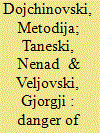

|
|
|
|
|
| Summary/Abstract |
The term “hybrid warfare” is a new one that the West began to use to explain its failure to cope with asymmetric threats. Focusing on the war on global terrorism, the West temporarily withdrew its attention from traditional adversaries, such as Russia, which has used this gap and has audaciously returned to the stage as a global actor. Until the Russian annexation of the Crimean Peninsula in 2014 and inflaming the Ukrainian crisis, most Western authors attributed “hybrid threats” mostly to non-state actors. But the Ukrainian scenario showed the true face of “hybridity” in the modern battlefield when practised by a powerful state actor. Russian “hybrid warfare” in Ukraine has already been seen as a combination of conventional and unconventional methods, that have been complemented with other instruments of national power – diplomatic, economic and information. The purpose of this article is, through an analysis of the Ukrainian scenario, to demonstrate that although the term “hybrid” is new, the concept itself is old and is a continuation of already seen doctrine from the Cold War era. Although “hybrid threats” can come both from state and non-state actors, the Russian interference in Ukraine is proof that they are especially dangerous for the West if, or when, they are initiated from a traditional, sophisticated adversary that has the capacity to use all forms of warfare.
|
|
|
|
|
|
|
|
|
|
|
|
|
|
|
|
| 3 |
ID:
183793
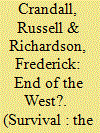

|
|
|
|
|
| Summary/Abstract |
In The Abandonment of the West, Michael Kimmage explores the relationship between American foreign policy and the ‘West’. The concept of the West, once a unifying idea in American culture, has undergone a sharp re-evaluation over the last century. Kimmage does not idealise the West or its history, giving a voice to the many critics of Western civilisation who have pointed out examples of US hypocrisy. At the same time, he notes that the West, especially in its heyday, accomplished great things, and he cautions against its wholesale abandonment – particularly at a time when the US and its allies are facing a host of domestic and international challenges.
|
|
|
|
|
|
|
|
|
|
|
|
|
|
|
|
| 4 |
ID:
192476
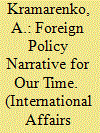

|
|
|
|
|
| Summary/Abstract |
IT SEEMS difficult to overestimate the importance of the work under review,* which has rightly been recommended as a textbook for students and trainees of the Diplomatic Academy. Its main merit is that it has overcome the key cognitive constraints of our political science - not only recent ones, but also those of the Soviet and earlier periods. In fact, the same can be said of the current Foreign Policy Concept of the Russian Federation, a truly innovative concept that meets the demands of the times and addresses the task of Russia's effective international positioning in a situation that bears all the hallmarks of a geopolitical revolution.
|
|
|
|
|
|
|
|
|
|
|
|
|
|
|
|
| 5 |
ID:
174052
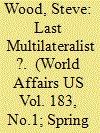

|
|
|
|
|
| Summary/Abstract |
Germany benefited most from post-war integration into liberal democratic structures, an experience that transformed it into an enthusiastic advocate of multilateralism and a model for other states. The current “illiberal turn” away from international institutions and, in some instances, international law, threatens Germany’s preferred orientation. As authoritarian regimes and populisms undermine the “liberal international order” that made Germany secure and prosperous, it may be left as one of few if not the only noteworthy advocate of multilateralism in global affairs.
|
|
|
|
|
|
|
|
|
|
|
|
|
|
|
|
| 6 |
ID:
164365
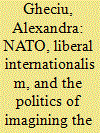

|
|
|
|
|
| Summary/Abstract |
International Relations scholars often assume that NATO represents the institutional expression of a pre-existing, liberal-democratic Western security community. However, far from simply representing a pre-given community, NATO has always been involved in power-filled processes of constructing “the West.” At the heart of those processes lie practices of collective (re)imagining of the Western world, as well as the representation of internal tensions as feuds within a community united by liberal values. Today, the task of managing internal differences has become particularly complicated due to the rise of radical conservative political forces in several allied states. This has translated into an unprecedented clash between liberal and illiberal interpretations of the Western community. This paper also shows that, contrary to conventional wisdom, middle powers have played important roles both in the construction of the liberal Western security community, and, more recently, in articulating an alternative—radical conservative—vision of the West.
|
|
|
|
|
|
|
|
|
|
|
|
|
|
|
|
| 7 |
ID:
173913
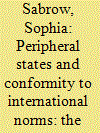

|
|
|
|
|
| Summary/Abstract |
This paper seeks to understand the seemingly paradoxical behaviour of states of the Global South, which on one the hand conform to transnational norms in order to integrate into the international society and on the other hand (sometimes simultaneously) differentiate themselves from them. To that end, this article develops the dilemma of the marginalised in order to show that conformity and differentiation become two paradoxical strategies for marginalised actors to pursue the same goal: equality with powerful states. The transformation of the Organisation of African Unity to the African Union, where significant changes in Africa’s policy vis-à-vis global powers took place, serves as a case study to illustrate how marginalised actors struggle between conformity and differentiation in order to claim their place in the international arena. It also shows how the dilemma of the marginalised can be compelling to help us understand the predicaments of marginalised actors across vastly different situations of structural inequality. Acknowledging the dilemma helps us understand their behaviour rather than to dismiss it as irrational, thereby recognising Third World agency in shaping the international system.
|
|
|
|
|
|
|
|
|
|
|
|
|
|
|
|
| 8 |
ID:
183782
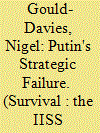

|
|
|
|
|
| Summary/Abstract |
Russian President Vladimir Putin’s invasion of Ukraine was a grand strategic error. He underestimated Ukraine’s cohesion and will to resist, the West’s unity and resolve, the vehemence of Russia’s domestic opposition and the wariness of Russian elites. While Putin’s resort to war reflected Russia’s limited options for trying to halt Ukraine’s drift away from its remaining pull, the war itself has shattered myths about Russia’s own strength. It has exposed economic vulnerability, serious failures of military planning and battlefield execution, and deficits in information and cyber warfare. Mooted compromises involving Ukraine’s partition or neutrality do not yet feel like stable solutions whose terms all sides will accept. Parallel escalation by Russia and the West appears to be the prevailing dynamic. But even if Russia out-escalates the West, the costs of victory will be very large, not least on the home front.
|
|
|
|
|
|
|
|
|
|
|
|
|
|
|
|
| 9 |
ID:
145873
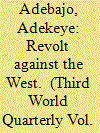

|
|
|
|
|
| Summary/Abstract |
Debates on intervention and sovereignty since 1945 can be summarised as a tale of two cities, San Francisco and Bandung, and of two countries, Rwanda and Libya. All are symbolic of different phases of these debates. The UN was born in San Francisco in 1945 with very little substantive participation by Asian and African governments. The great powers established a system in which they would determine when, where and how military interventions could take place. The 1955 Bandung Conference saw Asian and African countries seek to use new norms of intervention to regain their sovereignty. The 1994 Rwandan genocide, however, forced African countries to dilute notions of absolute sovereignty to allow military interventions for human protection purposes. The 2011 NATO military intervention in Libya did potentially irreparable damage to future UN-mandated interventions and was widely seen in the Global South as an abuse of the responsibility to protect (R2P).
|
|
|
|
|
|
|
|
|
|
|
|
|
|
|
|
| 10 |
ID:
165627
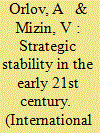

|
|
|
|
|
| Summary/Abstract |
ONE HUNDRED YEARS AGO, mankind entered the 20th century as the "golden age" of realized ideals of freedom and humanism. Reality proved to be different: this was the cruelest and the bloodiest period in the history of modern civilization.
|
|
|
|
|
|
|
|
|
|
|
|
|
|
|
|
| 11 |
ID:
167771
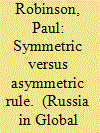

|
|
|
|
|
| Summary/Abstract |
This article proposes that although both Russia and the West claim to support an international order founded on a mutually agreed set of rules, their views of that order are very different. For Russia it is a system in which the same set of rules applies to everybody, and which might therefore be termed “symmetric.” For the West, it is a system in which those deemed “just” have more rights than those deemed “unjust,” and which might therefore be termed “asymmetric.” Through an analysis of recent trends in just war theory, the article will show that the asymmetric Western view of the international order is a natural outcome not only of the West’s relative power but also of human rights doctrines. The supremacy of these doctrines is not, however, fully accepted by Russia. Overcoming Western-Russian tensions requires, among other things, that the two sides find a mutually acceptable view of the international order. The logic outlined in this article demonstrates, however, that this will be difficult to achieve
|
|
|
|
|
|
|
|
|
|
|
|
|
|
|
|
| 12 |
ID:
192428
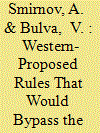

|
|
|
|
|
| Summary/Abstract |
THE West is drawing up rules for cyberspace that would circumvent the UN and other organizations and formats bringing together practically all countries of the world, and this plays a special role in the context of the vast hybrid war unleashed by the West against Russia and its allies. Unlike the legally binding norms that Russia and its allies insist on, these rules are meant to be nothing more than recommendations and are normally drafted by narrow groups of nations loyal to the US.
|
|
|
|
|
|
|
|
|
|
|
|
|
|
|
|
|
|
|
|
|